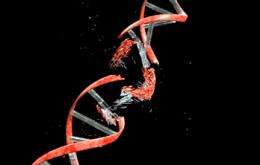Broken chromosome.
(PhysOrg.com) -- Yale University scientists have discovered how one protein plays a key role in repairing damage to chromosomes that can cause different types of cancer, they report in the September 26 online edition of Nature Structural & Molecular Biology.
Environmental influences such as radiation can damage chromosomes. Scientists are just beginning to explore the complex pathway that can repair the breaks in double-stranded DNA that have been linked to breast, pancreatic, and other forms of cancer.
“The results form the intellectual basis for the continuing dissection of the mechanism of chromosome damage repair and explain why defects in a key protein lead to cancer,” said Patrick Sung, chair of the department of molecular biophysics and biochemistry, researcher at the Yale Cancer Center and senior author of the paper.
The Yale team, in collaboration with researchers at the Lawrence Berkeley National Lab and the University of Virginia, describes how the large tumor-suppressing protein PALB2 enhances this repair process. The functions of this protein intrigue scientists because mutations in tumor-suppressing genes such as PALB2 and BRCA2 have been linked to breast and other cancers.
“We are just beginning to explore this repair process, but the ability to prevent or repair damage to our chromosomes has great therapeutic potential,” Sung said.
Provided by Yale University


















